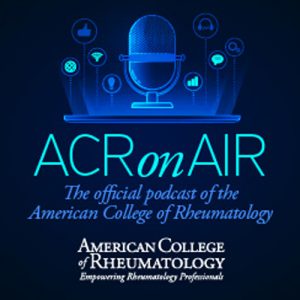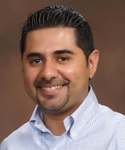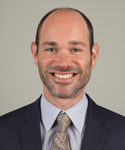The latest research on rheumatic disease, solutions for addressing practice management issues, legislative policies affecting patient care and ACR initiatives are among the topics that will be discussed on the ACR’s new—and recently launched—rheumatology podcast, says Jonathan S. Hausmann, MD, a pediatric and adult rheumatologist at Boston Children’s Hospital and Beth Israel Deaconess Medical Center, and an instructor in medicine at Harvard Medical School.
“The ACR has an obligation to educate the rheumatology community, and this provides an opportunity for people to learn in different ways,” he says. “Some people may like to listen to a podcast on a run or when they are in the car.”
Dr. Hausmann is the host of ACR on Air, the ACR’s official podcast, which debuted Aug. 20. New episodes of the podcast are scheduled to go live the third Tuesday of every month and are available online at www.ACRonAir.org or on Apple Podcasts, Google Play and other major streaming apps.
Podcast episodes are free and open to the public to stream and download.
Education Innovation
Although other rheumatology podcasts are available, plenty of room exists for more discussion about new scientific and clinical research.
Podcasts are an increasingly popular, convenient alternative to print or email formats for delivering rheumatology education, as well as legislative, practice management or other updates, says Suleman Bhana, MD, FACR, a rheumatologist in a multispecialty practice in New York state and chair of the ACR Communications and Marketing Committee.
“The ACR launching its own podcast is due to a convergence of lots of current trends in media. If you want to communicate with a medical audience, print may not always be the way to get it done. In our current workforce, there’s a swath of younger rheumatologists. How do you get information to them? They want to consume educational content in a way that is convenient,” says Dr. Bhana. “Also, the barrier of getting a podcast off the ground is much easier now.”
Dr. Bhana speaks from personal experience. He co-hosted The Rheumatology Podcast a few years ago with Paul H. Sufka, MD, a rheumatologist in Saint Paul, Minn. Newer production and streaming technologies give ACR on Air a highly polished sound, which was hard to achieve when he co-hosted his podcast, says Dr. Bhana.
“Now, it’s easier to do interviews that sound very professional. And with so many more microphone and boom options, it’s easy to make a podcast sound like it’s done in a studio, even though it is not,” he says.
As a regular listener to The Rheumatology Podcast, Dr. Hausmann was inspired to learn more about the podcasting medium and seized the opportunity to host ACR on Air. “I was a big fan of that podcast. It kept me up to date on new rheumatology articles being published, and the hosts always discussed how the article’s findings would change what we do in our daily practice and how we treat our patients,” he says.
Podcasts make medical education more accessible, says Michael S. Putman, MD, a second-year rheumatology fellow at Northwestern University Feinberg School of Medicine, Chicago, who recently launched his second rheumatology podcast, Rheum4Debate.
“Online resources these days provide such incredible opportunities to produce and distribute content. This has helped to fuel the #FOAMed [free, open-access medical education] movement. But unfortunately, this has been less active in rheumatology. The community has really started to take off, though,” says Dr. Putman, who says he listens to three rheumatology podcasts each week. “It’s fun, because we’re all providing something different.”
ACR on Air: What’s on Tap
In the podcast’s first episode, Dr. Hausmann interviewed Sheila Angeles-Han, MD, the lead co-author of the new juvenile idiopathic arthritis (JIA) clinical practice guidelines published in a series of articles in Arthritis Care & Research in June, including one on JIA-associated uveitis screening and treatment, and other therapeutic approaches for non-systemic polyarthritis, sacroiliitis and enthesitis.1,2
“We went behind the guidelines and asked questions like: ‘What were the challenges in creating these recommendations? How did [the authors], as relatively young rheumatologists, become the main authors of this very important manuscript?’” Dr. Hausmann says.
The premiere episode of ACR on Air also explores the challenges described in the 2015 ACR Workforce Study.3 “We talked about the findings in the Workforce Study, which predicts increased demand for rheumatology care, especially with the aging of the population, while at the same time the supply of rheumatologists is expected to decrease over time. We also interviewed a physician assistant to talk about how these rheumatology professionals can become involved to address the shortage of providers,” Dr. Hausmann says.
In the second episode, Drs. Bhana, Sufka and Hausmann analyzed selected articles published in recent issues of the ACR’s journals and provided commentary on their clinical implications.
A Recruitment Tool?
The September podcast will discuss the concept of value-based care, how it relates to updates to the Medicare and CHIP Reauthorization Act (MaCRA) program, and any issues that may affect rheumatology practice, notes Dr. Bhana. “This podcast will help you keep your thumb on the pulse of rheumatology.”
ACR on Air may even help address the core concern of the Workforce Study by attracting students to choose rheumatology as their specialty, says Dr. Hausmann.
“I hope the podcast will encourage people to enter the rheumatology profession and that our conversations will make more people excited about rheumatology as a career,” he says. “It’s the most exciting field in medicine today. Many medical students don’t know much about rheumatology, because they are not exposed to it during their training. This podcast is yet another avenue to show more people what rheumatology is all about and what we are accomplishing for our patients.”
Susan Bernstein is a freelance journalist based in Atlanta.
References
- Angeles-Han ST, Ringold S, Beukelman T, et al. 2019 American College of Rheumatology/Arthritis Foundation guideline for the screening, monitoring and treatment of juvenile idiopathic arthritis-associated uveitis. Arthritis Care Res (Hoboken). 2019 Jun;71(6):703–716.
- Ringold S, Angeles-Han ST, Beukelman T, et al. 2019 American College of Rheumatology/Arthritis Foundation Guideline for the treatment of juvenile idiopathic arthritis: Therapeutic approaches for non-systemic polyarthritis, sacroiliitis and enthesitis. Arthritis Care Res (Hoboken). 2019 Jun;71(6):717–734.
- Battafarano DF, Ditmyer M, Bolster MB, et al. 2015 American College of Rheumatology workforce study: Supply and demand projections of adult rheumatology workforce, 2015–2030. Arthritis Care Res (Hoboken). 2018 Apr;70(4):617–626.
Plenty of Rheum to Talk
ACR on Air is just the latest rheumatology podcast to hit the streaming scene. Other podcasts include:
- RheumNow, published and hosted by John J. Cush, MD, director of clinical rheumatology at the Baylor Research Institute, Fort Worth, Texas;
- Rheuminations, published by Healio Rheumatology and hosted by Adam J. Brown, MD; and
- Rheumatology, a podcast hosted by James Galloway, MD, and published by the British Society for Rheumatology.
A few years ago, Michael S. Putman, MD, a second-year rheumatology fellow at Northwestern University Feinberg School of Medicine, launched the Evidence-Based Rheumatology podcast, which has aired 42 episodes. His new podcast is Rheum4Debate, which offers a point/counterpoint-style clinical conversation co-hosted by rheumatologist Anisha B. Dua, MD, MPH, associate professor of medicine at Northwestern University. In their latest debate, they argued whether or not systemic lupus erythematosus patients on cyclophosphamide should take the antibiotic sulfamethoxazole/trimethoprim.
Dr. Putman publicizes his podcasts on Twitter at @ebrheum and @rheum4debate. He says social media “has provided an amazing forum for listeners to give feedback and discuss the articles. It has been especially fun to include Twitter polls before and after the Rheum4Debate show. Over a hundred people voted for or against the motion for the last one.”




